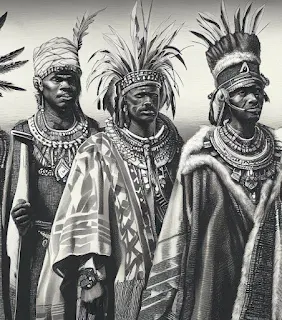British Empire Asserting Britain's Rule in Southern Africa
A modern-day role that can be compared to a High Commissioner is an Ambassador representing a country in another nation.
In the context of the British Empire, High Commissioners acted as representatives of the British Crown. These individuals were carefully selected by the British government, most commonly by the Secretary of State for the Colonies.
As representatives of the British government, High Commissioners were responsible for overseeing the administration of the Crown's affairs in various colonies and territories. This role often involved managing diplomatic relations with local leaders, overseeing economic development, and maintaining the stability and security of these regions.
The British Empire strategically employed the concept of High Commission Territories and appointed High Commissioners to assert and maintain Britain's economic dominance in Southern Africa. High Commissioners wielded significant authority, enforcing British economic interests through policies, taxation, and trade regulations.
This approach allowed the British Empire to exploit the region's resources, control trade routes, and maximize profits, all while influencing local governance structures to serve imperial economic objectives. In this way, High Commissioners played a pivotal role in sustaining Britain's economic rule in Southern Africa during the colonial era.
 |
| High Commissioner |
The British Empire Maintaining Britain's Rule in Southern Africa Under High Commissioners
High Commission Territories is a historical term related to the British colonial administration during the late 19th and early 20th centuries. The British Empire used the concept of High Commission Territories; these territories were generally situated in southern Africa and included areas such as Basutoland (modern-day Lesotho), Swaziland (now Eswatini), and Bechuanaland (present-day Botswana).
The United Kingdom appointed High Commissioners as representatives of the British Crown and the colonial government to enforce colonization, conquest, treaties, and trade agreements of the British Empire through direct rule. Under direct rule, British governors, commissioners, and other officials held significant authority. They made decisions about laws, policies, and governance without significant involvement from local leaders or institutions.
High Commissioners played a key role in enacting British laws and policies in the territories they oversaw. Traditional customary laws were officially replaced or changed forever, affecting how disputes were resolved and justice was administered. Colonial laws redefined land ownership and land rights, leading to land dispossession for local populations.
List of High Commissioners who served in Bechuanaland (Botswana), Basutoland (Lesotho), and Swaziland (Eswatini) with their respective dates.
Bechuanaland (Botswana):
Sir Marshal James Clarke (1885-1897)
Basutoland (Lesotho):
Sir Herbert Stanley (1912-1935)
Sir Edmund Richards (1935-1939)
Sir Evelyn Baring (1939-1940)
Sir Edmund Richards (1940-1942)
Sir Charles Arden-Clarke (1942-1945)
Sir Edmund Richards (1945-1947)
Sir Percy Wyn-Harris (1947-1951)
Sir Philip Furse (1951-1955)
Sir Charles Arden-Clarke (1955-1958)
Sir Francis Scott (1958-1961)
Swaziland (Eswatini):
Sir Alexander Grantham (1935-1942)
Sir Robert Armitage (1942-1947)
Sir Percivale Liesching (1947-1952)
Sir Mervyn Tuchet-Jesson (1952-1957)
Sir Arthur Benson (1957-1961)
Sir Humphrey Vicary Gibbs (1961-1964)
Taxation without Representation, the Plight of Indigenous Africans
High Commissioners introduced many forms of taxation in colonial territories. Taxes included land taxes, hut taxes, and other levies imposed on indigenous populations without their input or representation. Colonial subjects, who were required to pay taxes to the colonial authorities, did not have a say in the decision-making process or governance of the colony.
Taxation without representation placed an economic burden on indigenous Africans. They were required to pay taxes without having the ability to influence how those tax revenues were used or allocated.
1966, Bechuanaland gained independence from British rule and became the Republic of Botswana. Similarly, Basutoland became the Kingdom of Lesotho in 1966, and Swaziland (now Eswatini) achieved its independence in 1968.




